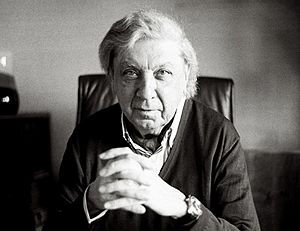Carlos Roqué Alsina facts for kids
Carlos Roqué Alsina (born February 19, 1941 – died August 5, 2023) was a talented French composer and pianist. He was originally from Argentina.
Contents
About Carlos Roqué Alsina
Carlos Alsina was born in Buenos Aires, Argentina. He started playing the piano when he was just six years old! He quickly began performing many concerts. First, he played in Latin America, then North America, and finally in Europe. Some of his concerts were led by famous conductors like Otto Klemperer and Semyon Bychkov.
At the same time, he taught himself how to compose music. He wrote his first piece when he was only fourteen. In Argentina, he was very active as both a pianist and a composer. He worked with different music groups, including "Nueva Musica" in Buenos Aires from 1959 to 1964.
His Time in Germany and New York
In 1964, Carlos was invited to Germany. This was part of a special program for artists. There, he met other important composers like Iannis Xenakis and Elliott Carter. In 1965, his piece Funktionen was played for the first time in Darmstadt. The next year, he became an assistant to conductor Bruno Maderna at the Deutsche Oper Berlin.
In 1967, Carlos moved to New York. He joined the Center of Creative and Performing Arts. He also taught many master classes on modern piano at the University at Buffalo. In 1969, he was a visiting professor at the Juilliard School. During this time, he also experimented with musical theater. An example is his "Trio" from 1967.
Founding "New Phonic Art"
In April 1969, Carlos Alsina helped start a group called "New Phonic Art." He founded it with Jean-Pierre Drouet, Michel Portal, and Vinko Globokar. This group focused on improvisation, which means making up music on the spot. They performed many concerts and toured all over the world.
In 1972, Carlos settled in France. Since 1978, besides playing and composing, he also taught music. He taught piano at the Conservatoire national supérieur musique et danse de Lyon for nine years. He was also a guest professor at several music schools in Europe.
Later Years and Legacy
In 2001, to celebrate his 60th birthday, the French Ministry of Culture asked him to compose a special piece called Phares et Rayonnements. Many concerts were held to celebrate his long and varied career.
Carlos Alsina continued to be active as a pianist, teacher, and composer throughout his later years. He gave recitals, taught master classes, and saw his works performed. He traveled a lot for his music, visiting places in Europe, North America, China, and Argentina.
Carlos Alsina's Musical Works
Carlos Alsina wrote over 110 musical pieces. Most of these were "commissioned," meaning musical groups or institutions specifically asked him to create them. His works have been performed at major modern music festivals around the world.
Here are some of his notable compositions:
- First Piano Study (Op.3)
- Second Piano Study (Op.6)
- Third Klavierstück for piano (Op.8) (1963–65)
- Funktionen (1965)
- Concerto for piano and orchestra (1965)
- Überwindung (1967) – This piece was first played in Donaueschingen.
- Schichten for instrumental ensemble (1971)
- Study for tonbak (1973) – The tonbak is a type of drum.
- A Letter (1976)
- Cantate (1977)
- La Muraille (1981)
- Prima Sinfonia (1983)
- Fantaisie for clarinet and orchestra (1991)
- Symphonie n° 2 (1992) for large orchestra – The Orchestre de Paris asked him to write this for his 50th birthday.
- Pénombres (1993) for choir, children's choir, and orchestra.
- Concerto en deux mouvements (1999) for wind quintet and orchestra.
- Phares et Rayonnements (2001)
- Concertino (2002) for piano and 12 instruments.
- Reflet (2002) for solo vibraphone.
- Reflets en trio (2002) for vibraphone, djembé (a drum), and marimba (like a large xylophone).
- Bel Canto (2009)
Awards and Honors
Carlos Roqué Alsina received several important awards for his contributions to music:
- 1986: He was named an Officier of the Ordre des Arts et des Lettres. This is a special honor from the French government for people who have done great things in arts and literature.
- 2004: The Académie des beaux-arts gave him the Paul-Louis Weiller Composition Prize. This award recognized all of his amazing musical works.
See also
 In Spanish: Carlos Roque Alsina para niños
In Spanish: Carlos Roque Alsina para niños
 | Claudette Colvin |
 | Myrlie Evers-Williams |
 | Alberta Odell Jones |


